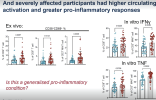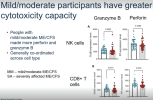That could explain why GET doesn't harm absolutely everyone,
It`s very interesting.
I definitely feel like I am in this very weird subgroup of MECFS patients (that might be considered none-MECFS in the future).
Got progressively more ill as a child, couldn't even pinpoint where it started. Still did sports because my parents forced me, and I was so mild there was no reason to think I was chronically ill. They finally relented when I was basically beaten to a pulp fencing, coming home with marks all over my body and looking completely worn out aged 15.
Then as an adult around 22, after I had been tested for what felt like everything at the time
they hired a personal trainer for half a year, and I tried exercising myself healthy for two years afterwards, and whilst I did deteriorate whilst this took place, I honest to God can not say if exercise accelerated my decline at all. I obviously had PEM constantly from the exercise, but sadly at this point I had MECFS for so long I had no idea that you were not supposed to feel like absolute crap a day or two after exercise. My personal trainer always remarked how weird it was that I could never emulate the same performance if I had not had a day of rest. He had to make loads of changes to his program like removing anything resembling cardio, which would absolutely murder me. He simply couldn`t understand why I was not gaining the muscle weight I was supposed to gain. He had never experienced anything like it, although to be fair he used to train elite soldiers.
No matter what I do I slowly deteriorate, and it comes in these bursts where it feels like I have the flu pretty much yearly, which lasts for weeks or months and leaves me permanently worse.
If I had been like the patients who get more ill permanently from exercise I would have been bedbound by age 9 from playing football and tennis 4 times a week. Whereas I will probably first approach being something resembling bedbound within a decade, around my mid 40s.
I do feel like the group that gets significantly worse from exercise has to be small, otherwise I feel like we would have a lot more severe patients. The majority of patients seems to have some kind of story of trying to push themselves with exercise.
The worst part is that the only improvement I have ever in twenty five years, was just after taking valaciclovir I got at an MECFS clinic recently (my parents guilt tripped me to go). I thought the idea of anti-virals was idiotic, there was no evidence for it as treatment, but not wanting to insult the kind person at the clinic I obliged and humoured them by taking it. Just after 3 days on it I could feel sleepy for the first time since early childhood, whilst also being able to breathe properly again, it felt like a miracle, like a switch had been pressed. I gradually kept improving, to the point where I was preparing to go back to uni and finishing my studies.
I remember having a day where I suddenly just felt so much better. I could increase my daily steps by twice the amount out of nowhere. I was able to read my old jurisprudence text books and actually understand what was written. Then sadly it gradually stopped working after 4-5 months, completely stopping after 9 months or so.
I honestly still think someone could force me to exercise, without permanently accelerating my decline. Of course I am not willing to torture myself to find out though!! I have to little life left as is.
there are people who believe it helped them.
I am in the embarrassing camp where I genuinely believed exercise helped me for a year or two. That was even after at least 13 years with MECFS (although I did not know MECFS existed at that point). This was also despite the fact that I was actually slowly deteriorating yearly. MECFS fluctuates so much in the mild and very mild category that you can convince yourself that pretty much anything works due to how much it fluctuates. Researchers are on to something by only having ´´sicker`` patients in their studies.
TLDR: I apologize deeply for the wall of text, I tried to bold everything related to exercise. Feel free to delete if anyone feels like it is derailing the discussion, I wont take offense.



